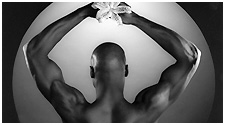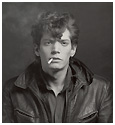|
| Interview mit den Regisseuren |
|
| Fenton Bailey und Randy Barbato |
|
| Mapplethorpe Directors Explain Why They Wanted to LOOK AT THE PICTURES: |
|
| „We´re attracted to people who are overexposed and under revealed.” |
|
| WHY THIS PROJECT? |
|
| Randy Barbato: Fenton and I lived in New York during the gay '80s in the East Village, so we were aware of Mapplethorpe. But we were more aware of him as a brand, as a name, and obviously the controversy [the trial following his last exhibit]. We’re attracted to people who are overexposed and under revealed. And Mapplethorpe really ticked that box. |
|
| Because we knew the name but we didn’t know the man or the artist, it was important for us to dig deep and represent him as an artist as much as possible and really try to pack the film with his work. |
|
| WHY NOW? |
|
| Fenton Bailey: Before he died he planned that exhibition, “The Perfect Moment,” and I think he knew exactly what impact it could have. But it would take a number of years before people could look at the pictures as he intended them too, as opposed to the way [former Senator] Jesse Helms and his supporters looked at the pictures. |
|
| As we were making it Randy and I felt, on the one hand, we’ve come a long way and it would be hard to imagine an exhibition showing explicit art resulting in a criminal trial. On the other hand, we feel that discussion about sex and sexuality and art feels as taboo as ever. |
|
| Randy Barbato: You can access pornographic images at the touch of your fingertips now, so we’ve become kind of sexually commodified as a culture, and yet Robert Mapplethorpe’s imagery still carries the same weight and impact. I think that’s because we as a culture are a split personality. We’re still as puritanical as we were back then; we’re sexualized but it’s all in the closet, and I think his intent carries the same power today as it did then even though the context of the times is completely different. |
|
| Fenton Bailey: We actually can remember back in the '80s when Robert Mapplethorpe was alive and working, and in the course of researching we were like, “Oh yes, there was a time when no one took [contemporary] photography as an art form seriously.” There also was a time when you could only print prints a certain size. We were struck by how small a lot of the early work was. We were excited to be able to “correct” that by putting it on a big screen. |
|
| The other thing that we were really surprised about -- there was an amazing review of a group show in which Mapplethorpe had a piece, and it was a male nude show, and an art critic basically said, “Female nudity in art, great. Male nudity, wrong.” It was extraordinary. But I suppose it’s like a frog in a boiling pot of water; the temperature rises and you don’t really notice these changes. |
|
| Randy Barbato: Even being openly gay. It was like another world back then. Even in the art world. It really was a different time. Mapplethorpe was a kind of pioneer in so many different ways. In terms of the art of photography, in terms of being openly gay, even in terms of, not only the brutal honesty he applied to his artwork but also to the life he led. |
|
| LIFESTYLE AS ARTWORK |
|
| Randy Barbato: In today’s “selfie” culture people often don’t think twice about posting explicit pictures of themselves -- and that’s not a judgment. You can draw a direct line between that and what Robert Mapplethorpe would do. I think he was very prescient. What he was doing at the time no one would dare to do and call it art, and now, we’re all doing it and don’t think twice about it. |



